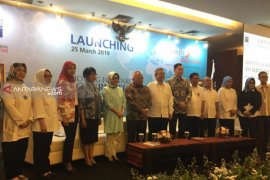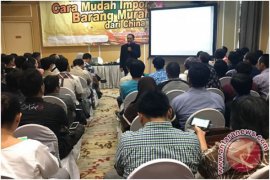Jakarta (Antara Bali) - Indonesia is facing heavy challenges in international trade in 2017, according to a senior official.
"Indonesia's economic growth, over the past several years, has relatively slowed down," Ari Satria, secretary of the National Export Development Directorate General, noted.
He stated during the Association of Southeast Asian Nations (ASEAN) Business Talks held in Jakarta that Indonesia is optimistic of increasing its economic growth this year, with a projection of between 5.1 percent and 5.3 percent.
Satria had remarked on Thursday that this year, Indonesia is facing heavy challenges with regard to its economic growth, export performance, and policies of other countries against Indonesia.
Apart from the economic growth projection, the Trade Ministry has also set a target of increasing exports by 5.63 percent for non-oil and non-gas products.
The market share for Indonesian products also expanded to Africa, particularly South Africa and other African countries.
Indonesia noticed considerable potential and has established cooperation through bilateral Free Trade Agreements (FTAs).
"The biggest destination countries for Indonesia's exports included the US, China, Japan, India, and Singapore. Apart from the ASEAN members, as our nearest trade targets, other markets beyond the bloc are also still wide open, and we can maximize our efforts to utilize them, such as that of Africa" he noted.
Apart from market expansion through FTAs with several African nations, the trade ministry's official also touched on the logistics aspect in international trade that often poses a problem for the export activities of small- and medium-scale industries.
"For the ASEAN, logistics tariffs are expensive, as the active expedition services belong to foreign firms. The government and relevant ministries have issued 14 economic policy packages and are discussing to issue the 15th package," he revealed.
Satria said the latest policy will encompass the logistics aspects where the government will necessitate exporters of certain commodities to use the national logistics services.
Other countries' trade policies pose further challenges for Indonesia in its international trade.
He cited the policy of US President Donald Trump who has included Indonesia on its list of countries he accused of using unfair trade practices. Others include the imposition of a progressive tax on crude palm oil (CPO) in Europe.
Satria explained that with the US, the policy has just been issued and has not yet affected Indonesian exports. Yet, he pointed out that Indonesia has not committed any mistake in this regard.
"We always practice fair business. The products that we export to the US are complementary goods, so it is reasonable if Indonesia experienced a big surplus because the US did not do the same thing," he explained.
Satria also cited shrimp as an example.
"They need it, so we export the commodity to them. The same thing also applies to coffee. This plant can only grow in areas having tropical climate. They cannot grow coffee, so they import it from us," he explained.
With regard to exporting CPO to Europe, particularly France, Satria said it was due to a blackmail or wrong information circulated about the commodity.
"We do not know it yet, but it seems that non-governmental organizations (NGO) were involved," he remarked.
He stated that Indonesia's CPO is cheaper as compared to that offered by other countries, so it prompts others to use unfair business practices.
Thus, they spread rumors that Indonesia's CPO contains dangerous substances and for its production, Indonesia uses child labor.
"However, all of it is not true," he remarked.
Satria said his office has also invited members of the French Parliament to visit Indonesia to observe the palm oil plantations to prove that the rumors are not true.
"However, they have not yet given a response," he added. (WDY)




